Full House: Jackmaster, Oneman, and Ben UFO sit down for a state of the union on UK bass music.
“Smell this,” says Glaswegian DJ and Numbers label co-owner Jack Revill (a.k.a. Jackmaster), as he […]
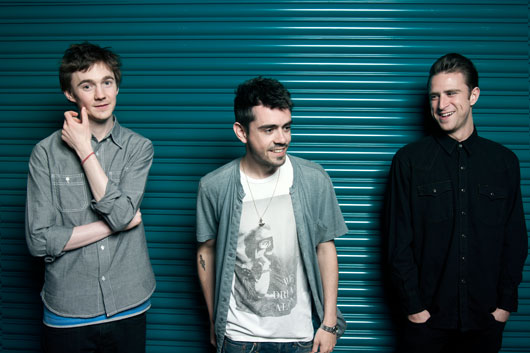
Full House: Jackmaster, Oneman, and Ben UFO sit down for a state of the union on UK bass music.
“Smell this,” says Glaswegian DJ and Numbers label co-owner Jack Revill (a.k.a. Jackmaster), as he […]

“Smell this,” says Glaswegian DJ and Numbers label co-owner Jack Revill (a.k.a. Jackmaster), as he hands me a piece of freshly pressed vinyl. “It’s the best smell in the world,” adds his friend and London native Ben Thomson (better known as Ben UFO), a DJ who co-runs Hessle Audio and has, today, brought this new Peverelist tune for his peers to check out.
I’ve gathered the two of them, along with Rinse FM DJ and 502 Recordings head honcho Steve Bishop (a.k.a. Oneman, also from London) to discuss what’s up with the bass-laden tracks that have been emanating from the city’s underground in recent years. Such oh-so-hard-to-classify types of tunes have been pushed to the fore precisely because of guys like these, who have managed to make names for themselves as trendsetting DJs without putting a finger to production software—a rare achievement in the world of dance music.
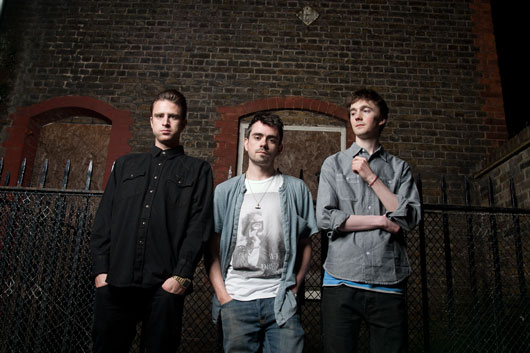
From left: Jackmaster, Oneman, Ben UFO
Sitting in a swank conference room in the center of London on an uncharacteristically sunny Friday afternoon, Jackmaster sports his trademark quiff hairdo, Ben UFO opts for a t-shirt to complement his shaggy brown locks and sweet, shy disposition, and Oneman rolls up in a cap and button-down. They’re primed and ready to chat about the problematic nature of genre categorizations, building a set out of the freshest tunes alongside the classics, and their unique position as knowledgeable selectors who don’t dabble in production.
(The record smells ace, by the way.)
XLR8R: If you had to explain to your grandmother what kind of music you play, what would you say?
Ben Thomson: If you try and define anything, you’re always going to be missing something.
Jack Revill: I’m just trying to think how I’d describe it to my nan.
BT: I’ve tried. I gave her a CD.
JR: Did she like it?
BT: Yeah.
JR: I suppose I’d start with disco, which everyone kind of knows. And then try and explain how, from that, house was developed. It’s weird because my taste has kind of gone full circle.
BT: The fact that all of our tastes have changed is easier than it was before, because we have access to everything. We’ve all reached a similar place from a lot of different places.
JR: And that means we can educate each other all the time. If I did a back-to-back with Ben, I’d come home with the names of five tracks on my iPhone that I need to pick up. Everyone has their own niche knowledge.

How do you guys feel about the term “UK bass music”?
JR: I hate it. It makes out that what we do is stupid. I don’t have any ideas on how better to classify it. What about you, Ben?
BT: I’m not into it, but I’m not sure I’d be into anything, really.
JR: Certain genre names and classifications are necessary for a healthy discussion of the music. But the term “bass music” makes it harder, almost, because you’re trying to put all these things under one big umbrella.
BT: And we don’t make it easy by playing so much different stuff.
JR: Some of the stuff I play in my DJ sets you could call bass music. When someone asks me what I play I kind of go off for 10 seconds, then just say house.
BT: With bass music, I think trying to put it all under one name is an arrogant thing to do anyway. Because we’re playing so much older stuff. What we do almost has more in common with older-style DJs.
JR: When does it become bass music? Does it become bass music when one of us plays it? Or when Hyperdub releases it, is it then bass music?
BT: That’s also kind of an arrogant thing were we to claim that.
Steve Bishop: I prefer the term UK house, because UK house never had the chance. I think the time feels about right to just call it that, if anything. The sound I’m really into at the moment, which is kind of what we all do, is a marriage of garage, jungle, dubstep, broken beat—it all falls into underground music from London. I don’t know if that should have a name. The [thing about] ‘future garage’ which always annoys me is that there’s garage going on still.
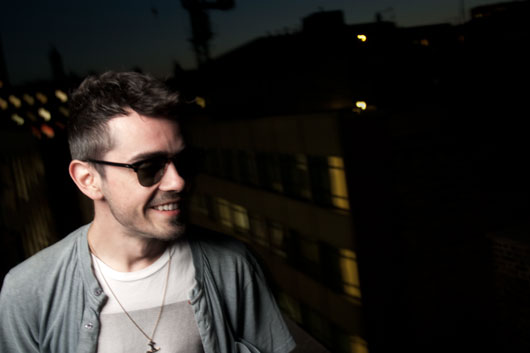
Do you feel the same about “post-dubstep”?
SB: If someone says to me, “What is post-dubstep?”, I’d say it’s like…dubstep with singing on it or something. I don’t know what it is.
BT: Post-dubstep in particular just means fuck all.
SB: It’s just another buzzword.
JR: In a way, I think UK bass conjures up images of kids at New Years, just really stupid. And when I hear post-dubstep, I feel like it’s taking itself too seriously.
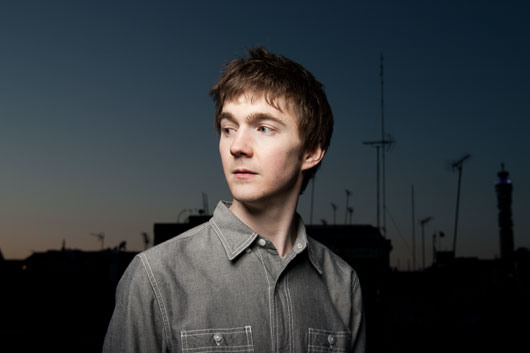
In playing older tunes alongside new ones in your sets, do you feel any responsibility to “teach the children” about earlier music?
BT: I don’t really have a desire to teach, or even claim to be in a position to teach. I think this feeds into the idea of why I dislike trying to bracket everything together into one name. I feel quite committed to the idea that you can hear a piece of music and enjoy it in the context of the place where you are and the DJ that’s playing without needing to know any more about the track. If a track is right for the time, for the moment, then what it is just doesn’t matter. So the dancefloor is a really important place. It’s somewhere where you can lose all of that and really focus on hearing the music. That’s why I get frustrated when people demand IDs and tracklists. Because, in my head, that shouldn’t matter.
Even as a label owner?
BT: Even as a label owner, yeah. But, you’re right. It’s about striking a balance, and I probably shouldn’t feel so strongly about that. Because it’s great that people are interested. And interested enough to ask questions as well. And that’s the reason I play music—because I ask those questions, too.
SB: I think the problem with that is, in the past five or 10 years, the focus on the DJ as something to look at… you’ve got all these old videos from warehouse raves where it used to be people just dancing. They would look at their friends or the floor or the sky. They would never look at the DJ [as] the physical representation of the music.
Do you think this is a regional or cultural issue?
JR: Dance music culture is just going that way.
SB: With Twitter, Facebook, and everything on the internet, a lot of people are listening to this music in places where you can’t go out and see what it’s like.

Do you all ever get to go out for fun anymore, and when you do, can you experience that type of dancefloor abandon?
JR: This is something I think about a lot. I used to be that kid who, at 11 o’clock, I’d take a pill and be first on the dancefloor, and I’d be the last one off it. I wouldn’t want to go to the toilet in case I missed a tune. Or in case I missed a moment. And now, I go to my own parties, or Numbers in Glasgow and maybe I won’t be DJing, and am just sat in the DJ booth like this [nods head along to music] all night, just worrying that everyone’s having a good time, worrying that the guy’s doing a good set, and not really enjoying it. The whole reason I got into this was because I fuckin’ like dancing, man.
SB: I think going to clubs when you’re younger is almost like school for a DJ. Going to see someone play, being in that environment, soaking it all up, then being like, “What can I bring to this table?”
JR: What you were saying about playing old records with newer stuff, when I’m drawing for old records like Underground Resistance, that’s me trying to recreate a moment I experienced when I was a lot younger. I play this because I felt a very strong emotion that can’t be produced by anything else, and I’m trying to give someone else that experience.
Do you think it works?
JR: Sometimes.
BT: That’s the only reason I feel dubious about playing old music, is that I have tried to recreate experiences that meant a lot to me, and they’ve fallen flat. That makes you doubt the power of the emotion that you felt.
JR: That feeling that you got when you heard that record when you were 16 and it was going off—I think the only way to feel that now is when you’re playing and you have that moment behind the decks.
BT: I still feel like I’m going to school. When I go to nights that are completely unconnected to what we do, that’s only way I can feel that.

Do any of you have aspirations to produce?
SB: I’m not bothered. My heart is in DJing.
JR: A lot of times recently I’ll go to see mates play in a club and everyone’s going crazy, they’ve got a big queue out the door for their name. And I think maybe I’d like a wee bit of that sort of thing. I know the only way I can get there is if I make some tunes. And then I think, this is not the right reason to make music. You shouldn’t make music because you want to be famous or because you want to make more money or get more gigs—you do it to express yourself. If you’re not doing it to express yourself, then what comes out is not going to be honest. It’s going to be bullshit. I think eventually one day I’ll make a record, but it’ll be because I need to do it as an outlet.
SB: And we all have record labels as well. I guess we’re more prone to picking up records that we do like and putting them out. Like Ben, you didn’t really have the profile you have now when you started yours.
BT: We’ve definitely proved that it’s not necessary.
SB: For me, I think it was just the right place at the right time. Playing old records from a related scene in this new rebirth.
BT: I’m not sure it would be possible in this scene now.
SB: No.
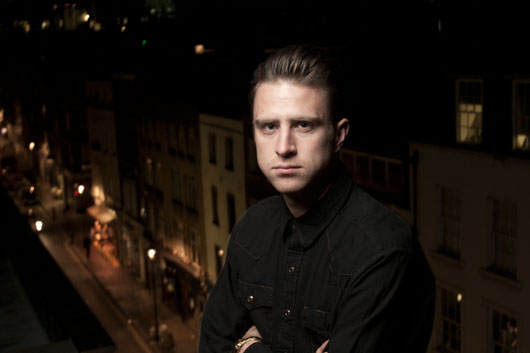
Why not?
JR: It’s oversaturated, but also it’s this catch 22 in that playing the old in with the new is—unless you’ve got three, four, five unreleased tracks, exclusive tracks—people aren’t really interested. They’re not going to download your mix or they’re not going to comment on a forum. To get to that place where you’re going to get the dubs, you need to be recognized. But you can’t get recognized as a DJ doing mixtapes unless you have the dubs.
BT: That’s so different to the way it was before. I remember all it took on Dubstep Forum to get people to listen to your mix, and get 30 or 40 responses to a mix—this was like, 2005, early—all you had to do was put something up. And if it was good, you’d get a really good response. That was the most important thing for me in terms of really getting into DJing was other people’s positive responses. Whereas now, if I was to post up mixes of fully released tunes, it’d get like 20 views or something.
JR: There’s something I think that’s quite dangerous about that situation. How, even before a track’s released, it’s considered old.
SB: Plus with things like YouTube, people ripping something out of a radio set and uploading it. Nothing disappears.
BT: I don’t think it’s an end-of-history situation, though, at all. Something new will happen… It’ll have to, because to come up through the same avenues that we all did would be impossible.
Any idea what it will be?
JR: If I knew that, it’d already exist.

